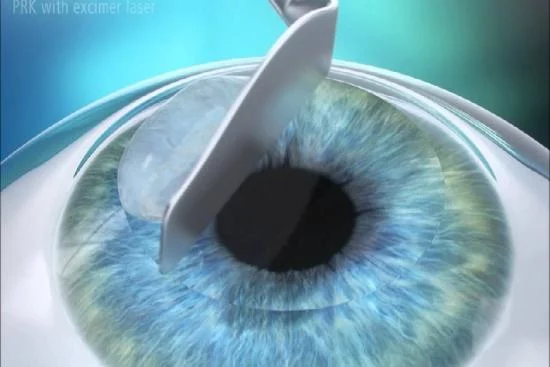The PRK laser treatment, like the LASIK, Femto-LASIK, or Lasek technique, is a refractive surgery that seeks to repair refractive flaws that inhibit clear vision.
In contrast to Lasik surgery, the PRK laser procedure does not involve a lamellar cut of the cornea by a microkeratome. To shape the tissue, the excimer laser is used to remove between 5% and 10% of the cornea's surface thickness. The excimer laser is, in fact, an instrument that produces laser light in the wavelength of 193 nanometers.
Vision defects can be treated with photorefractive keratectomy in Turkey at one of our partner clinics equipped with the best cutting-edge technologies.
We're Here to Help.

- Patients with myopia
- Patients who prefer not to wear glasses or contact lenses
- Dry eye
- Visual blurs
- About 20 minutes for both eyes
- Clear vision after 6 months
- 95%
What is photorefractive keratectomy?
Refractive surgery in Turkey brings together several surgical techniques to correct vision defects or treat specific pathologies affecting the ocular surface.
PRK, or photorefractive keratectomy, is an operation that permanently alters the shape of the cornea, reducing or eliminating myopia, hyperopia, or astigmatism. The procedure is similar to LASIK (LASer-assisted In Situ Keratomileusis) surgery, in that it involves the use of an excimer laser.
PRK is an effective technique for treating myopia as a refractive error. Indeed, this technique can correct myopia up to about 5 to 6 diopters, but beyond these values, the technique begins to lose its precision.
The correction of astigmatism generally obtains fewer results than those obtained in the case of myopia.
However, with the latest laser generation, you get optimal results, even on severe astigmatism.
In the case of farsightedness, good results are obtained when there are minor defects, but if the farsightedness is high, the PRK technique is not recommended.
The advantages of the PRK technique
The PRK technique is suggested in the presence of visual defects of mild or moderate magnitude. In the case of high-degree refractive errors that cannot be treated with other techniques such as LASIK which is contraindicated in the case of the particularly thin cornea.
The photorefractive keratectomy is:
- A relatively simple operation
- Not painful
- Free of significant risks that can occur during and after the procedure
The course of the operation
The first step in PRK surgery is the removal of the epithelium, a thin protective layer that covers the cornea. In our best eye centers in Turkey, epithelium removal is performed with the transepithelial technique. Indeed, it consists of using the laser to remove the epithelium without touching the cornea with mechanical instruments. The transepithelial technique is a special feature of the Visx Star S4 IR excimer laser.
During the second phase, the laser reshapes the cornea with controlled pulses.
PRK is a painless procedure performed under topical anesthesia (numbing eye drops) on the same day, in the best eye centers in Turkey. Laser surgery takes less than two minutes, depending on the extent of the correction needed.
The postoperative period of PRK surgery is characterized by generally rapid recovery times.
After the laser treatment, the surgeon proceeds to apply a therapeutic contact lens, which will remain in place for a few days (often a week).
Unlike LASIK treatment, eye pain is more likely to be felt, sometimes even very intense. This pain is the result of the removal of the corneal epithelium. Besides, it can be treated with painkillers.
The healing of the corneal wound takes place in a fairly short time (usually three or four days is enough). However, visual recovery is longer (about two weeks).
For full stabilization, you will have to wait even a few months.
Possible results of the procedure
In the vast majority of cases, the desired results are achieved with photorefractive keratectomy and no additional vision correction is required.
A very small percentage of patients (about 5%) do not achieve the desired results, or there is a regression in vision corrections achieved with PRK. Therefore, it is always necessary to use glasses or contact lenses even if they are less effective.
The reasons why not all patients get the desired result are related to the fact that not all people respond the same way to laser treatment.
However, you can re-treat after 90 days.
What are the possible Side effects?
Photorefractive keratectomy is considered to be a very safe procedure. However, even in the case of simple operations, there is no absolute certainty that no complications will occur.
In the case of PRK, complications are very rare. There is a risk of infections. Other problems can result from a delay in epithelialization.
Besides, the corneal epithelium regrows in a few days, but in some cases, it may take more time. It is not a complicated problem, but it is certainly annoying. The patient must extend the period of suspension from normal work and recreational activities.
Corneal opacities may occur in some cases, especially when significant myopia has been treated.
Prices: How much does this procedure Cost in Istanbul Turkey?
The ability to improve vision and get rid of glasses and contact lenses makes PRK desirable for many patients. The cost of the operation varies according to the severity of the visual defect to be treated, and the technology used by the surgeon.
Factors that influence the prices are:
- The degree of visual angle to be corrected: The cost of PRK surgery is generally more expensive for those with severe visual problems
- The type of laser technology used: The latest technologies are generally more expensive than the older ones. Before deciding, you should research the prices of the various procedures available in Istanbul, Turkey to understand exactly what to expect.
- The experience of the surgeon and his professional reputation: the cost of the operation may depend on the skills of the ophthalmologist. More experienced surgeons working in renowned clinics and hospitals usually have more expensive rates.
Share this page
